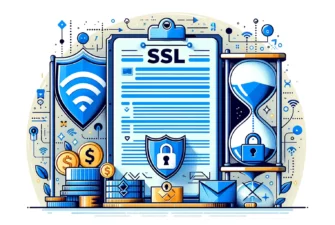
SSL certificates secure websites of all types and sizes, but what if you have multiple domains that need protection? Can you secure them with a single certificate? The answer is a resounding yes. All you have to do is get a multi-domain SSL certificate. But here’s where things might get a little tricky.
Multi-domain certs are also known as SAN or UCC certificates, and all these names can confuse new users. Our visitors often ask us, “What is a UCC certificate?” That’s why we wrote this article about UCC certs, so everyone understands what they are and how they work.
Table of Contents
- What Is a UCC Certificate?
- Why Should You Use a UCC SSL Certificate?
- UCC SSL Features
- What Are the Best UCC Certificates?
- How to Get a UCC Certificate?
What Is a UCC Certificate?
A UCC (Unified Communications Certificate) certificate is a digital certificate designed to secure multiple domain names or subdomains within a single certificate. It secures websites, email servers, and other online services, ensuring encrypted communication between clients and servers. UCC SSL certificates are commonly used by individuals and organizations that manage multiple domains or subdomains on a single server or across multiple servers.
Why Should You Use a UCC SSL Certificate?
A Unified Communication certificate allows you to secure multiple domain names or subdomains under a single SSL installation. As a result, you can protect several websites or online services without needing separate certificates for each, saving you time and effort in managing your security setup.
Moreover, instead of purchasing individual certificates for each domain, which can add expenses, a standard UCC SSL certificate covers multiple domains, providing a more economical solution for securing your online assets.
Overall, UCC SSL certificates simplify the management of your security infrastructure. With just one certificate to manage, you can facilitate renewals, installations, and monitoring, reducing the administrative burden.
How Does a UCC Certificate Work?
A UCC SSL Certificate encrypts data transmitted between a user’s browser and a web server.
Here’s how it works:
- Certificate Authority (CA): The process begins with a Certificate Authority, a trusted entity that issues digital certificates. When you request a UC Certificate, the CA verifies your ownership of the domains you want to secure.
- Securing Multiple Domains: Once verified, the CA issues a single UCC SSL certificate that includes all the domain names you specified during the application process. This way, you can secure multiple domains or subdomains with just one certificate.
- Encryption and Communication: Once installed, the UCC SSL certificate encrypts data transmitted between a user’s browser and your web server using the Transport Layer Security (TLS) protocol. Depending on the number of Subject Alternative Names (SANs) included, it secures multiple websites or subdomains under one certificate, protecting information in transit from cyber-thieves.
Next, let’s discuss the features of UCC SSL certificates
UCC SSL Features
Multi-domain certificates include excellent features to further boost your website’s security and credibility. Here are six of them:
- Secure up to 250 domains under one installation: A standout feature of UCC SSL certificates is their ability to secure up to 250 domains under a single certificate, allowing for efficient management of multiple hostnames on a single server.
- Domain Validation, Business Validation, and Extended Validation support: UCC certificates offer various validation levels, including Domain Validation (DV), Organization Validation (OV), and Extended Validation (EV), ensuring the security and authenticity of your primary domain and associated domains.
- Compatibility with browsers and all major systems: Enjoy seamless compatibility across browsers and all major systems. Your websites will be accessible to users regardless of their preferred platform.
- Generous SSL warranties and site seals: UCC SSL certificates come with generous SSL warranties, providing financial protection in case of security breaches. Additionally, they include static and dynamic site seals to reassure visitors of the security of your websites.
- Unbreakable encryption: With a UCC certificate, your websites benefit from unbreakable encryption, safeguarding sensitive data transmitted between users and your server.
- Unlimited Server Licenses: UCC certs include unlimited server licensing, allowing you to use the certificate on multiple servers without additional costs or restrictions.
What Are the Best UCC Certificates?
The best UCC certificates are the ones that fit your needs and budget. Since all SSL certificates, regardless of brand, type, and price, offer the same encryption strength, you should look at UC certificates’ extra features and validation support.
Here are the top UCC certificates based on their validation level:
- DV UCC Certificates – ideal for securing multiple domain names, blogs, personal websites, office communications servers, and small business sites.
- OV UCC Certificates – perfect for e-commerce websites, NGOs, startups, and medium-sized companies.
- EV UCC Certificates – the premium choice to secure financial institutions, banking websites, and large enterprises.
How to Get a UCC Certificate?
To obtain a UCC SSL certificate, follow these steps:
- Choose the certificate: Select the UCC SSL certificate that best suits your needs, considering the number of additional domains and subdomains you want to secure, along with the fully qualified domain name (FQDN) for your primary domain.
- Submit the CSR (Certificate Signing Request): Generate a CSR for your primary domain, including the FQDN and any additional Subject Alternative Names (SANs) corresponding to the domains and subdomains you wish to secure. Ensure the CSR accurately reflects all the domains and subdomains you intend to include in the certificate.
- Wait for CA Validation and Issuance: Submit the CSR to the CA for validation and issuance of your certificate. The CA will verify the ownership of the primary domain and any additional domains or subdomains listed in the CSR to ensure compliance with validation requirements.
- Install the Certificate on Your Server: Once the CA validates and issues your certificate, you can install it on your web server, email server, or other platforms where you intend to secure communication.
That’s all it takes to secure multiple websites with a single certificate.
Bottom Line
Securing multiple domains with a Unified Communications certificate is the most efficient way to save time and money. With one-time configuration and renewal, you streamline the SSL management and ensure all your websites comply with the latest SSL practices.
Now that we’ve answered the “What is a UCC certificate?” question, you can enjoy the benefits and features anytime you need to secure several domain names.
Save 10% on SSL Certificates when ordering today!
Fast issuance, strong encryption, 99.99% browser trust, dedicated support, and 25-day money-back guarantee. Coupon code: SAVE10



























